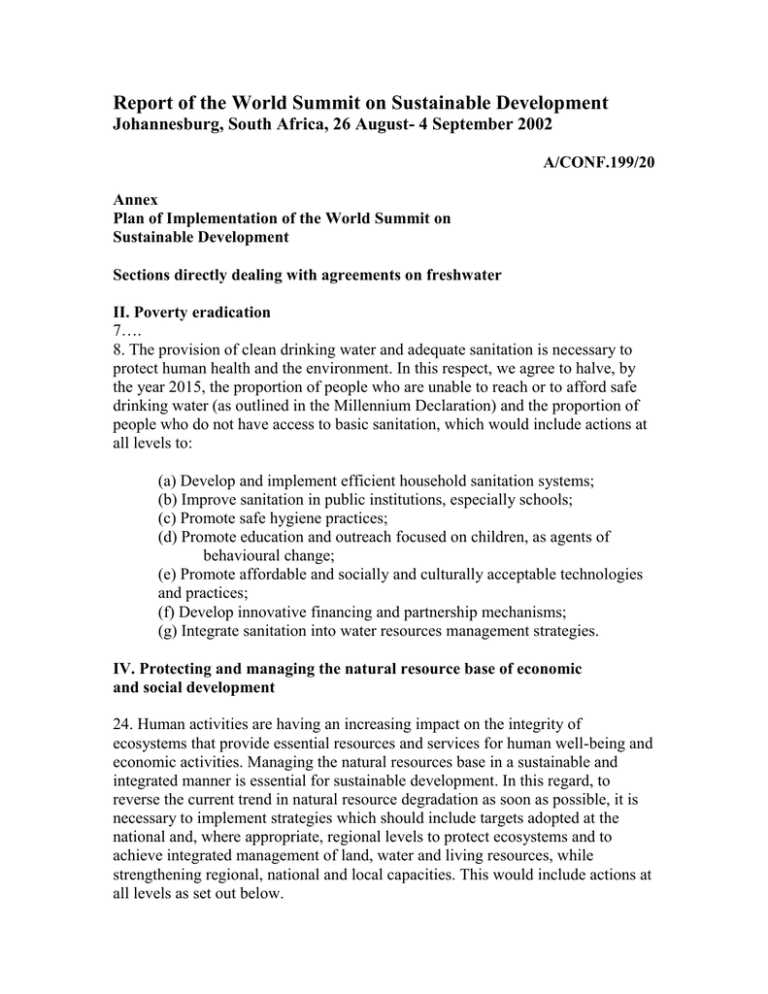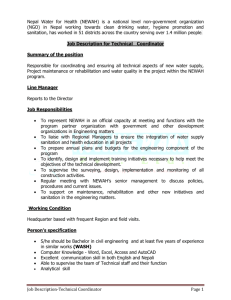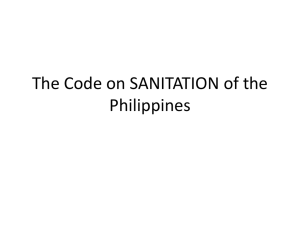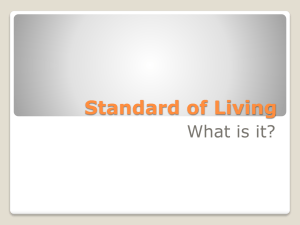Report of the World Summit on Sustainable Development
advertisement

Report of the World Summit on Sustainable Development Johannesburg, South Africa, 26 August- 4 September 2002 A/CONF.199/20 Annex Plan of Implementation of the World Summit on Sustainable Development Sections directly dealing with agreements on freshwater II. Poverty eradication 7…. 8. The provision of clean drinking water and adequate sanitation is necessary to protect human health and the environment. In this respect, we agree to halve, by the year 2015, the proportion of people who are unable to reach or to afford safe drinking water (as outlined in the Millennium Declaration) and the proportion of people who do not have access to basic sanitation, which would include actions at all levels to: (a) Develop and implement efficient household sanitation systems; (b) Improve sanitation in public institutions, especially schools; (c) Promote safe hygiene practices; (d) Promote education and outreach focused on children, as agents of behavioural change; (e) Promote affordable and socially and culturally acceptable technologies and practices; (f) Develop innovative financing and partnership mechanisms; (g) Integrate sanitation into water resources management strategies. IV. Protecting and managing the natural resource base of economic and social development 24. Human activities are having an increasing impact on the integrity of ecosystems that provide essential resources and services for human well-being and economic activities. Managing the natural resources base in a sustainable and integrated manner is essential for sustainable development. In this regard, to reverse the current trend in natural resource degradation as soon as possible, it is necessary to implement strategies which should include targets adopted at the national and, where appropriate, regional levels to protect ecosystems and to achieve integrated management of land, water and living resources, while strengthening regional, national and local capacities. This would include actions at all levels as set out below. 25. Launch a programme of actions, with financial and technical assistance, to achieve the Millennium development goal on safe drinking water. In this respect, weagree to halve, by the year 2015, the proportion of people who are unable to reach or to afford safe drinking water, as outlined in the Millennium Declaration, and the proportion of people without access to basic sanitation, which would include actions at all levels to: (a) Mobilize international and domestic financial resources at all levels, transfer technology, promote best practice and support capacity-building for water and sanitation infrastructure and services development, ensuring that such infrastructure and services meet the needs of the poor and are gender-sensitive; (b) Facilitate access to public information and participation, including by women, at all levels in support of policy and decision-making related to water resources management and project implementation; (c) Promote priority action by Governments, with the support of all stakeholders, in water management and capacity-building at the national level and, where appropriate, at the regional level, and promote and provide new and additional financial resources and innovative technologies to implement chapter 18 of Agenda 21; (d) Intensify water pollution prevention to reduce health hazards and protect ecosystems by introducing technologies for affordable sanitation and industrial and domestic wastewater treatment, by mitigating the effects of groundwater contamination and by establishing, at the national level, monitoring systems and effective legal frameworks; (e) Adopt prevention and protection measures to promote sustainable water use and to address water shortages. 26. Develop integrated water resources management and water efficiency plans by 2005, with support to developing countries, through actions at all levels to: (a) Develop and implement national/regional strategies, plans and programmes with regard to integrated river basin, watershed and groundwater management and introduce measures to improve the efficiency of water infrastructure to reduce losses and increase recycling of water; (b) Employ the full range of policy instruments, including regulation, monitoring, voluntary measures, market and information-based tools, land-use management and cost recovery of water services, without cost recovery objectives becoming a barrier to access to safe water by poor people, and adopt an integrated water basin approach; (c) Improve the efficient use of water resources and promote their allocation among competing uses in a way that gives priority to the satisfaction of basic human needs and balances the requirement of preserving or restoring ecosystems and their functions, in particular in fragile environments, with human domestic, industrial and agriculture needs, including safeguarding drinking water quality; (d) Develop programmes for mitigating the effects of extreme water-related events; (e) Support the diffusion of technology and capacity-building for nonconventional water resources and conservation technologies, to developing countries and regions facing water scarcity conditions or subject to drought and desertification, through technical and financial support and capacity-building; (f) Support, where appropriate, efforts and programmes for energy-efficient, sustainable and cost-effective desalination of seawater, water recycling and water harvesting from coastal fogs in developing countries, through such measures as technological, technical and financial assistance and other modalities; (g) Facilitate the establishment of public-private partnerships and other forms of partnership that give priority to the needs of the poor, within stable and transparent national regulatory frameworks provided by Governments, while respecting local conditions, involving all concerned stakeholders, and monitoring the performance and improving accountability of public institutions and private companies. 27. Support developing countries and countries with economies in transition in their efforts to monitor and assess the quantity and quality of water resources, including through the establishment and/or further development of national monitoring networks and water resources databases and the development of relevant national indicators. 28. Improve water resource management and scientific understanding of the water cycle through cooperation in joint observation and research, and for this purpose encourage and promote knowledge-sharing and provide capacity-building and the transfer of technology, as mutually agreed, including remote-sensing and satellite technologies, particularly to developing countries and countries with economies in transition. 29. Promote effective coordination among the various international and intergovernmental bodies and processes working on water-related issues, both within the United Nations system and between the United Nations and international financial institutions, drawing on the contributions of other international institutions and civil society to inform intergovernmental decisionmaking; closer coordination should also be promoted to elaborate and support proposals and undertake activities related to the International Year of Freshwater, 2003 and beyond. *** Source: http://www.johannesburgsummit.org/html/documents/summit_docs/131302_wssd_report_reissued.pdf



